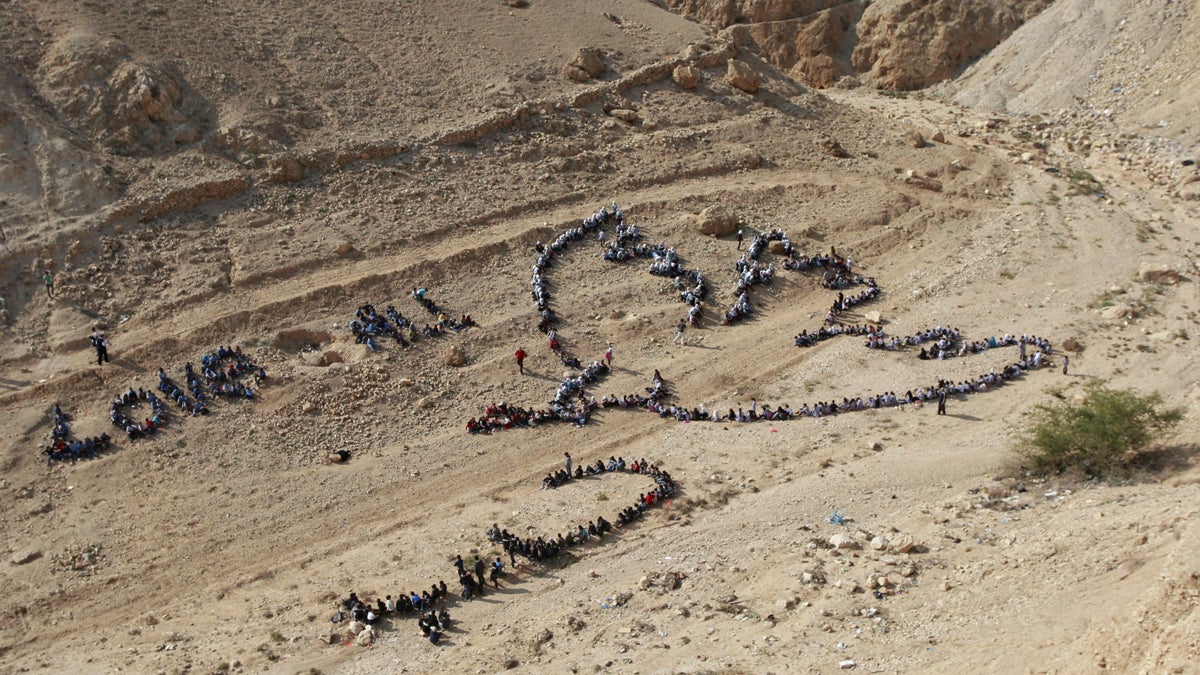Defining ‘freedom’ is a task for all who care to earn it

Hundreds of Palestinian children joined a United Nations Relief and Works Agency activity to send out a message of peace by lining up in the shape of a dove and the words "Love All" in English and "Love" in Arabic, designed by international environmental artist John Quigley, near the West Bank city of Jericho, Friday, Nov 25, 2011. (AP Photo/Nasser Shiyoukhi, file)
The Third Annual Freedom Seder on March 25 was a wake-up call for me to think more seriously about what “freedom” means to me in my daily life.
Five storytellers answered the question “What does freedom mean to you?” that night at the National Museum of American Jewish History in Philadelphia amid music and delicious food. Their stories moved men and women in the audience to tears.
Being free to coming out as a gay person
Quitting one’s job to be free of deception
Visiting a grandfather’s European homeland to meet the widow whose husband saved that grandfather from the Nazis
Quivering in court as “the hanging judge” decides if you will stay in America or be sent away, alone, without family.
Don’t know what you’ve got ’til it’s gone
More than 200 guests discussed the concept of freedom with their table mates. But when I returned home and looked up the Oxford American Dictionary definition of “freedom,” I was somewhat disappointed: “The power or right to act, speak or think as one wants without hindrance or restraint; the power of self-determination attributed to the will; unrestricted use of something.”
Compared to the stories I had heard, these definitions did not do the word justice.
When I woke up the next morning I realized that, as a person born in the United States, I grew up expecting freedom. It was a given in my young life. But my year in Israel with my first husband and then two children in 1973 changed that.
The Seder is the story of the exodus of the Jews from slavery in Egypt to freedom in their own land. In Israel, the Jews have fought wars to retain their freedom in their own new land, and I lived through one of those wars. Painting our windows to block out the light, carrying flashlights in the dark on the way to the dining room, running to and then sleeping in the underground miklat (bomb shelter) several times a day for weeks, as we were bombarded by enemy fire, gave “freedom” a brand-new meaning, because it was threatened daily.
Shivering in the miklat while bombs were dropping nearby, I understood that freedom has to be repeatedly earned and savored, not just taken for granted, as I had for so many years.
When I returned from Israel, my concept of freedom had shifted considerably. I no longer took it for granted. It was a privilege that I had to earn, maybe daily. And I had a responsibility to keep it alive.
Freedom contains multitudes
After hearing all the stories at the Freedom Seder, I realize that freedom means something slightly different to each person, based on personal experiences.
Regardless of how each person learns about or earns it, I believe freedom includes an absence of fear and suffering, the right to speak, write and sing your truth without retaliation, and the privilege to practice those activities responsibly.
Freedom also carries with it a burden. If I believe that someone’s freedom is being threatened, and I can write a letter or do a kind act or in some way alleviate that person’s suffering, then my responsibility as a free person is clear. We must protect each other’s freedoms without doing harm.
I am now more aware of the need to expand the meaning of “freedom” to embrace people of every race, creed, color, or sexual orientation. In the end, perhaps the real meaning of “freedom” is to allow others to define it for themselves, so long as it does not threaten, reduce, or eliminate mine.
Fittingly, the Seder ended with all of us singing a beautiful song by Mosh Ben Ari, of the band Sheva: “Od Yavo Shalom Aleinu,” which means, “Peace will come to us.” Perhaps a Freedom Seder implies that without freedom there is no peace, and without peace there is no freedom.
WHYY is your source for fact-based, in-depth journalism and information. As a nonprofit organization, we rely on financial support from readers like you. Please give today.

